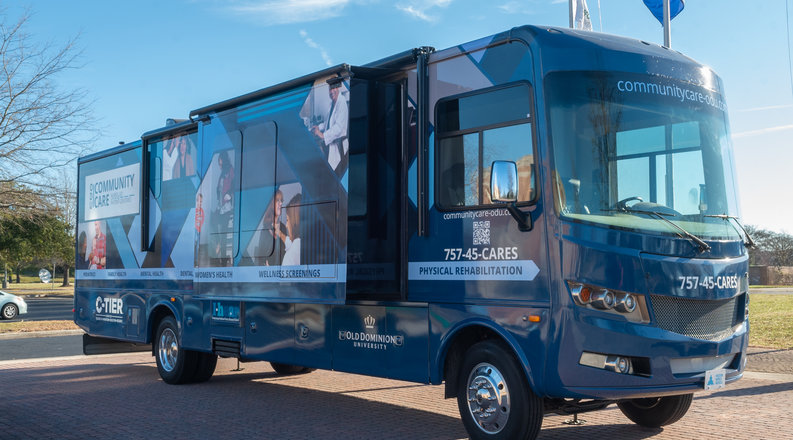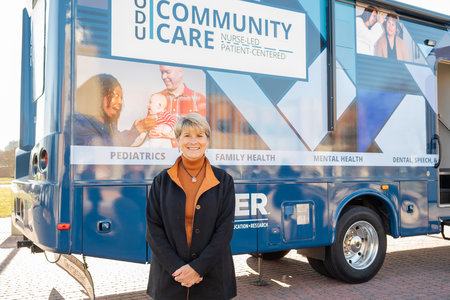In rural communities, limited access to healthcare, increased poverty levels, transportation challenges and higher unemployment rates conspire to create significant health disparities. At the same time, a national shortage of health care workers has made it harder for aspiring nurses to gain the clinical rotation experience they need.
This spring, Old Dominion University’s School of Nursing plans to address both challenges when it launches a mobile health clinic in Southampton County, providing an additional option for much-needed care while simultaneously offering a training ground for nurses.
The van is an entrepreneurial solution to the limited supply of professionals who provide education, supervision and evaluation in a clinical setting. “It’s very hard to find preceptors,” said Carolyn Rutledge, the associate chair of the School of Nursing who also serves as the project director. “So, we are building our own infrastructure.”
The mobile health clinic is funded through a four-year, $4 million federal grant from the Health Resources and Services Administration. The customized van will be operated by nurse practitioners and offer a spectrum of care provided by students and faculty from across the University, including mental health, physical therapy, athletic training, dental hygiene, speech and human services. The van offers space to draw blood and conduct testing, along with two patient care rooms, including the option to offer women’s healthcare.
The school will incorporate telehealth to help residents connect with specialists and other allied health professions. Having the ability to bring health care directly to residents through telehealth services will enable the mobile health team to monitor patients with chronic conditions, such as diabetes or congestive heart failure.
By engaging with the community of Southampton County, ODU students and faculty working with community providers will have opportunities to practice collaboration while delivering culturally sensitive care, according to Rutledge.
Over the course of the grant cycle, the mobile health clinic aims to provide care at least three days a week. The project will be staffed by family nurse practitioner, pediatric nurse practitioner and psychiatric-mental health nurse practitioner providers and students. All advanced practice registered nursing students in the Nursing Scholars Program will participate in longitudinal rotations with an interprofessional team. Rutledge hopes students will be inspired to stay and help the community. “The people who want to do it are the people who really have a passion for it,” she said. “ODU’s nursing programs have been very strong in drawing people who want to be in rural areas.”
The School of Nursing has discussed partnerships with Bons Secours Southampton Memorial Hospital, offering follow-up services for recently discharged patients, and telehealth screenings to limit unnecessary emergency room visits. The clinic hopes to collaborate with the Foodbank of Southeastern Virginia and the Eastern Shore to present training on relevant topics, such as diabetes care. They’ll also be working with the Western Tidewater Early Childhood Collaboration to work with the community’s underserved children.
“As an early childhood initiative, we are looking forward to the ODU clinic providing physicals and immunizations to our youngest learners,” said Mary Bradshaw, program coordinator for Smart Beginnings Western Tidewater.
From her perspective, the timing is perfect. The area’s only practice providing obstetrics and gynecological care recently announced plans to relocate farther away. “As you can imagine, this will surely impact women’s reproductive healthcare in our area. ODU’s mobile health clinic couldn’t arrive soon enough!” she said. “Thanks to the University’s generosity, innovation and expertise, we know that children, women and families will be supported and thrive.”
"When you really look at healthcare costs, so much of the cost is due to health care needs not being met. If we can help our students learn how to break down barriers to care, we can move things forward tremendously.”
Rutledge believes the clinic, if successful, has the potential to provide stable, reliable care.
“They get physicians to come into the area, but they stay two years and then leave. They're looking for us to set up a model that would be continuous," she said. “We just do not do as good a job as we could. When you really look at healthcare costs, so much of the cost is due to health care needs not being met. If we can help our students learn how to break down barriers to care, we can move things forward tremendously.”
Karl Heck, president and CEO of Franklin Southampton Economic Development Inc., is grateful for ODU’s outreach into the community.
“The ODU mobile health clinic will improve access to quality medical care for our neediest residents, which is critical for workforce participation and better educational outcomes. Making it easier, and more practical, to obtain medical services in an area where transportation can be a key challenge will improve health outcomes and lifespans,” he said.
“ODU’s initiative is bringing millions of dollars of valuable medical services here to improve the lives of our people. We greatly appreciate this effort.”




